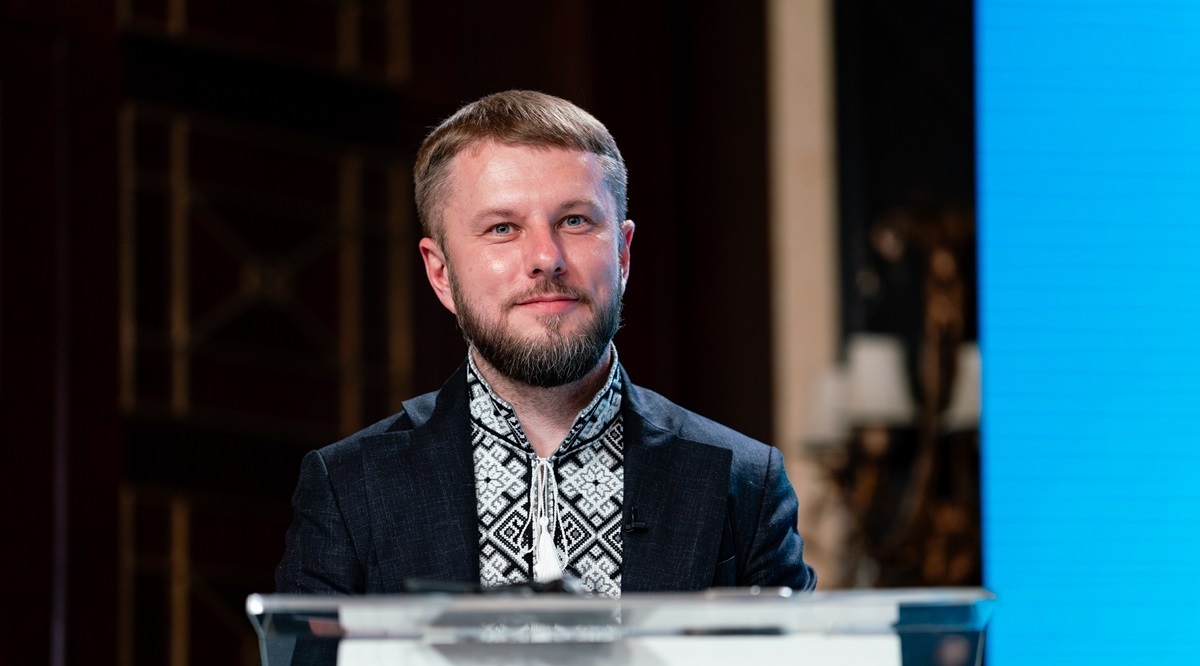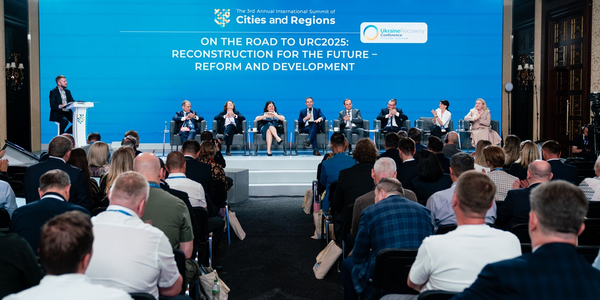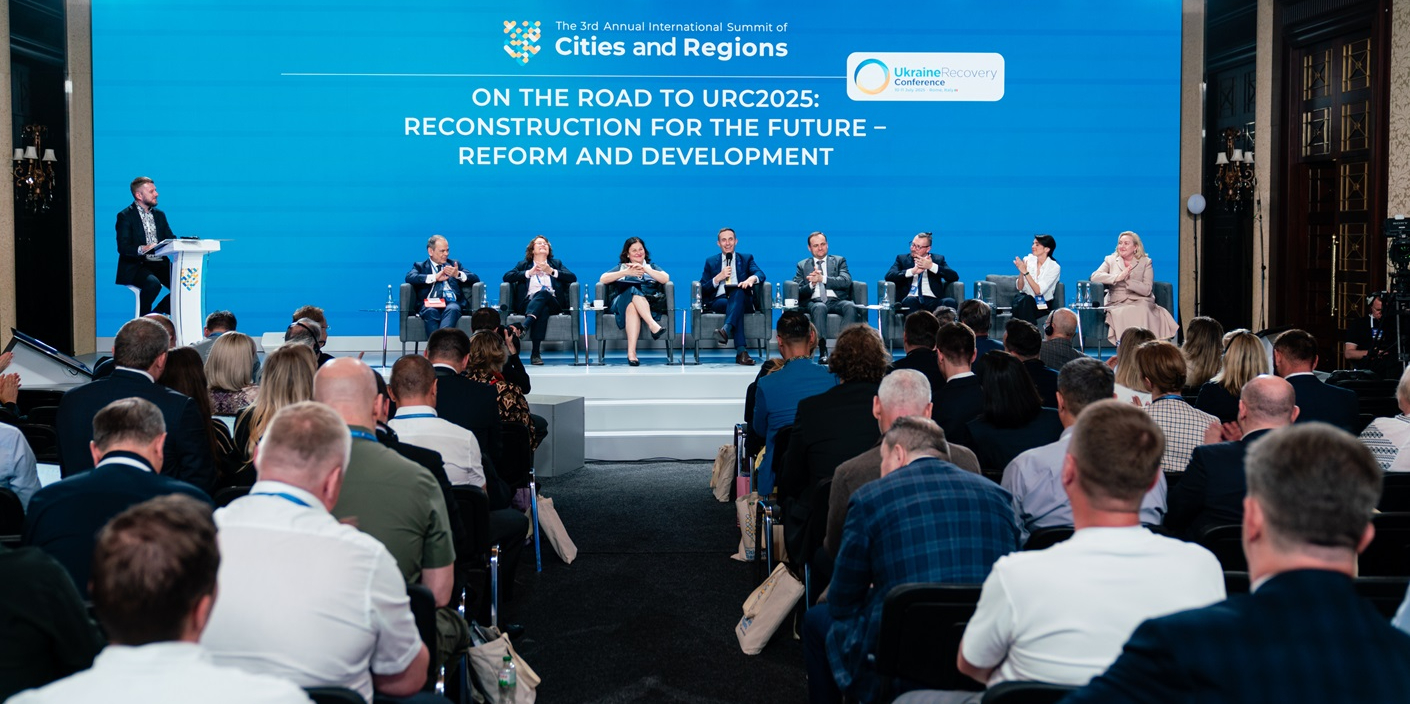Decentralisation and sustainable communities become a pillar of support for Ukraine amid full-scale war, - Oleksii Kuleba
Oleksii Kuleba, Deputy Prime Minister for the Restoration of Ukraine – Minister for Development of Communities and Territories of Ukraine, participated in the panel discussion “Towards URC 2025: Rebuilding for the Future – Reforms and Development” as part of the 3rd International Summit of Cities and Regions.
The Ukraine Recovery Conference (URC 2025), which is set to be held in Rome, is expected to be a key event in the development of a new framework for supporting, rebuilding, and modernising Ukraine. The aim of the dedicated panel is to bring together the perspectives of the national government, local authorities, international partners, and civil society on the key reforms that should underpin Ukraine's recovery and development.
These include:
- reforming public administration;
- strengthening local self-government;
- introducing new approaches to regional development;
- attracting investment;
- ensuring transparency and digital monitoring through tools such as DREAM;
- aligning all reforms with the requirements and standards of European integration.
Oleksii Kuleba, Deputy Prime Minister for Restoration, noted that Ukraine is implementing unique reconstruction projects despite full-scale war, constant blackouts, shelling, and funding shortages. This is only possible thanks to the fruitful and joint work of local authorities, the state, and international partners.
‘Ukraine has been living under conditions of full-scale war for over three years. It is precisely in these circumstances that a new model of interaction between the national and local governments has emerged – one based on partnership and quality. Without exaggeration, the decentralisation reform has become a pillar of support for Ukraine. Communities have been granted the power, resources, and abilities to make decisions. This foundation proved crucial during the full-scale invasion in 2022. Today, local self-government continues to perform its functions, even in challenging conditions, in cooperation with regional military administrations and the state. At URC2025, we must demonstrate to our international partners our joint approach with communities to recovery and specific projects,’ said Oleksii Kuleba.

Mr Kuleba also mentioned that the state’s main focus right now is supporting the frontline territories. For instance, as part of the Ukrainian President’s initiative, 180 communities received additional funding totalling almost UAH 2 billion. This money has been used to fund mobile shelters, generators, road repairs, and equipment.
The panellists also included Petr Kulgánek, Minister of Regional Development of the Czech Republic; Davide La Cecilia, Special Envoy of the Italian Minister of Foreign Affairs for the Reconstruction of Ukraine; Antje Grotheer, Chair of the Working Group on Ukraine of the European Committee of the Regions; Katarina Mathernova, EU Ambassador to Ukraine; Mathieu Mori, Secretary General of the Congress of Local and Regional Authorities of the Council of Europe, Vitalii Bezgin, Member of the Ukrainian Parliament, Tetiana Yehorova-Lutsenko, Deputy Chair of the Chamber of Regions of the Congress of Local and Regional Authorities under the President of Ukraine, and Rehina Kharchenko, Acting Mayor of Zaporizhzhia.
The panel was moderated by Oleksii Riabykin, Deputy Minister for Development of Communities and Territories.

Davide La Cecilia, Special Envoy of the Italian Minister of Foreign Affairs for the Reconstruction of Ukraine, emphasised that the Ukraine Recovery Conference 2025 will be an important step in mobilising investment in reconstruction and finding new solutions to meet Ukraine’s urgent needs.
‘The focus is on both future reconstruction and supporting Ukraine’s current efforts, as well as engaging the international community. The conference aims to raise awareness, attract investment and rebuild and modernise the country in line with the logic of EU accession. We also firmly believe that reconstruction should be based on a bottom-up approach. Communities are more than just interested participants in the URC. They understand their own reconstruction needs and can create appropriate projects. Direct dialogue with them is a step towards making the reconstruction process more effective,’ said the Special Envoy of the Italian Minister of Foreign Affairs for the Reconstruction of Ukraine.
Katarina Mathernova, the EU Ambassador to Ukraine, noted that in her opinion, decentralisation has been one of the most successful reforms in Ukraine.
‘I am often asked which of the reforms implemented by Ukraine has been the most successful. I am convinced that it is decentralisation. If Ukraine had not been decentralised, regardless of the first or second wave of decentralisation, it would not have survived so well in the early days, weeks and months of the full-scale invasion. It is the ability to work together at a local level that has fostered resilience and resistance within communities. I am very pleased that the European Union supports decentralisation through our programme,’ said the EU Ambassador to Ukraine.
Mathieu Mori, Secretary General of the Congress of Local and Regional Authorities of the Council of Europe, also emphasised the importance of decentralisation reform and the introduction of democratic innovations in Ukraine at the local level.
‘Today, Ukrainian society is very active at the community level. Communities have many opportunities to implement their own initiatives and often receive support from local authorities. This demonstrates to the world that Ukrainian democracy, values, and identity remain strong despite the current situation. We have recently conducted a survey which shows that 77% of Ukrainians fully support decentralisation and agree that it is a highly successful reform. That is why, as the Congress and the Council of Europe, we are working so hard to ensure that the 2014 decentralisation reform success story continues after the war,’ commented the Secretary General of the Congress of Local and Regional Authorities of the Council of Europe.

The International Summit of Cities and Regions is one of the key events for strengthening local self-government and international cooperation in the context of recovery.
The event was attended by Volodymyr Zelenskyy, President of Ukraine, Ruslan Stefanchuk, Chairman of the Verkhovna Rada, Andrii Yermak, Head of the Office of the President, Denys Shmyhal, Prime Minister, representatives of over 100 foreign delegations, and leaders of Ukrainian communities and regions.

Tags:
Oleksii Kuleba Oleksiy̆ Riabykin
Source:
Decentralization portal

23 January 2026
Employment services closer to community...
The Cabinet of Ministers of Ukraine has adopted a resolution that directly strengthens the capacity of communities in...
23 January 2026
Стартував відбір на Резиденцію ідей «Культурна спільнодія»
Стартував відбір на Резиденцію ідей «Культурна...
Пізнайте, як культура працює з досвідом війни, пам’яттю та відновленням спільнот – як формується взаємодія між...
22 January 2026
Громади отримають черговий пакет фінансування на 119 проєктів відновлення за підтримки ЄІБ
Громади отримають черговий пакет фінансування...
Громади отримають 740,3 млн грн, для реалізації 119 проєктів відновлення у громадах, за підтримки Європейського...
22 January 2026
Стартував відбір громад до другої черги проєкту «Рух без бар’єрів»
Стартував відбір громад до другої черги проєкту...
Міністерство розвитку громад та територій України розпочинає прийом пропозицій від громад для участі другій черзі...